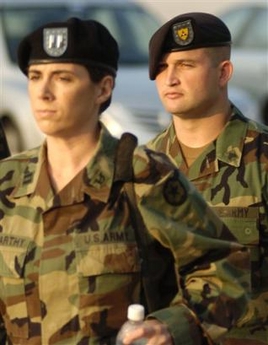An Army dog handler convicted of tormenting Iraqi detainees at Abu Ghraib
prison with his snarling animal was unrepentant, telling a court-martial jury
that soldiers aren't supposed to be "soft and cuddly."

Sgt. Michael J. Smith, right, walks toward the
Magistrate Court building along with one of his defense lawyers, Capt.
Mary G. McCarthy, Wednesday, July 27, 2005, in Fort Meade, Md. A jury has
found Smith, an Army dog handler, guilty of six of 13 counts of abusing
detainees at Abu Ghraib prison in Iraq.
[AP] |
Sgt. Michael J. Smith, 24, of Fort Lauderdale, Fla., was found guilty Tuesday
of six of 13 counts. A judge later dismissed one count, and Smith could face up
to 8 1/2 years in prison. His sentencing hearing was set to continue Wednesday.
Smith told the court-martial jury that he wished he had learned in basic
training how to better avoid getting into trouble with superiors. Soldiers who
do not "end up in a heap of trouble," he said.
Prosecutors said Smith let his unmuzzled black Belgian shepherd Marco bark
and lunge at several prisoners for his own amusement. One of the photographs
that exposed the Abu Ghraib scandal shows his dog straining on its leash, just
inches from the face of a cowering prisoner.
"Soldiers are not supposed to be soft and cuddly," Smith testified.
Defense attorneys said Smith was a good soldier who believed he was doing
what the government wanted canine handlers to do at the prison in Iraq: provide
security and frighten interrogation subjects. Defense attorney Capt. Mary G.
McCarthy said all that Smith's dog did to prisoners was bark at them.
Master Sgt. Shannon Wilson, who directly supervised Smith at the kennels in
Fort Riley, Kan., where Smith's unit is based, testified that Smith was an
exceptional soldier whose infractions didn't amount to abuse.
"Anything short of being bit is a psychological deterrent," Wilson said.
The defense also argued that Abu Ghraib was a dangerous, chaotic place where
policies were so murky that even the colonel who supervised interrogations
testified he was confused.